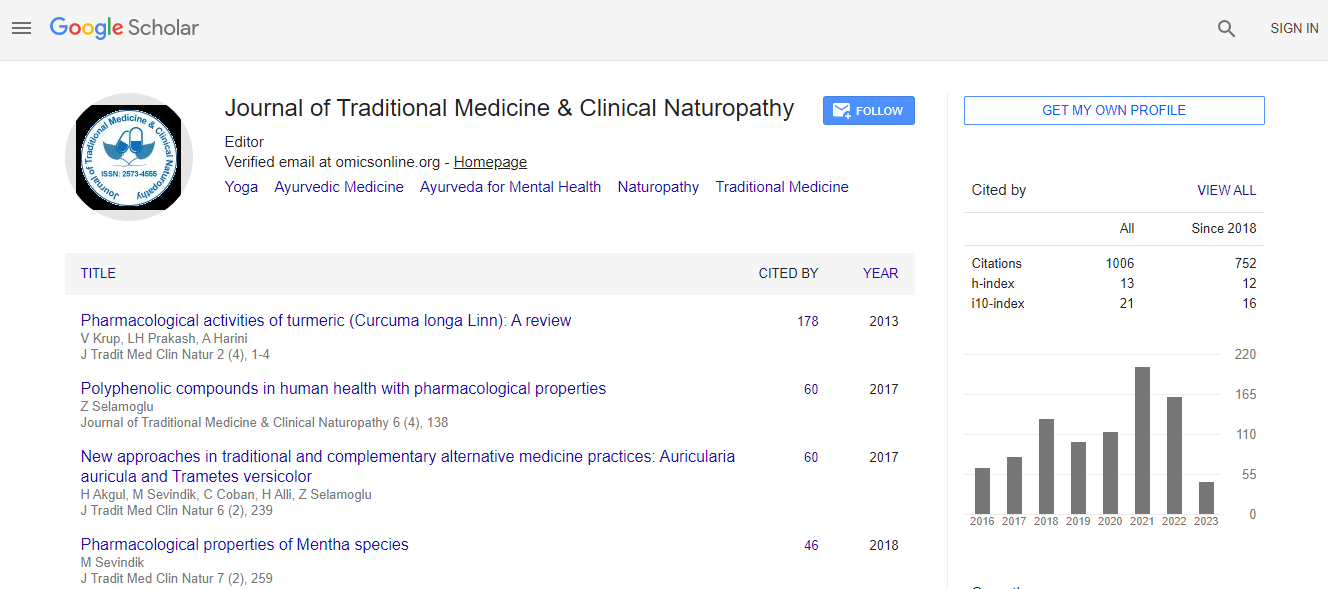Our Group organises 3000+ Global Events every year across USA, Europe & Asia with support from 1000 more scientific Societies and Publishes 700+ ������ Journals which contains over 50000 eminent personalities, reputed scientists as editorial board members.
������ Journals gaining more Readers and Citations
700 Journals and 15,000,000 Readers Each Journal is getting 25,000+ Readers
Citations : 1504
Indexed In
- CAS Source Index (CASSI)
- Google Scholar
- Sherpa Romeo
- Open J Gate
- Genamics JournalSeek
- RefSeek
- Directory of Research Journal Indexing (DRJI)
- Hamdard University
- EBSCO A-Z
- Publons
- Geneva Foundation for Medical Education and Research
- Euro Pub
- ICMJE
Useful Links
Recommended Journals
Related Subjects
Share This Page
Histopathological and biochemical investigations of protective role of honey in rats with experimental aflatoxicosis
6th International Conference and Exhibition on Traditional & Alternative Medicine
Turan Yaman, Zabit Yener and Ismail Celik
Yuzuncu Yil University, Turkey
ScientificTracks Abstracts: J Tradi Med Clin Natur
DOI:
Abstract
The aim of this study was to investigate the antioxidant properties and protective role of honey, considered a part of traditional medicine, against carcinogen chemical aflatoxin (AF) exposure in rats, which were evaluated by histopathological changes in liver and kidney, measuring level of serum marker enzymes, antioxidant defense systems, and lipid peroxidation content in liver, erythrocyte, brain, kidney, heart and lungs. For this purpose, a total of eighteen healthy Sprague-Dawley rats were randomly allocated into three experimental groups: A (Control), B (AF-treated) and C (AF+honey-treated). While rats in group A were fed with a diet without AF, B, and C groups received 25 �?¼g of AF/rat/day, where C group additionally received 1mL/kg of honey by gavage for 90 days. At the end of the 90-day experimental period, we found that the honey supplementation decreased the lipid peroxidation and the levels of enzyme associated with liver damage, increased enzymatic and non-enzymatic antioxidants in the AF+honeytreated rats. Hepatoprotective and nephroprotective effects of honey is further substantiated by showing almost normal histological architecture in AF+honey-treated group, compared to degenerative changes in the liver and kidney of AF-treated rats. Additionally, honey supplementation ameliorated antioxidant defense systems and lipid peroxidation content in other tissues of AF+honey-treated rats. In conclusion, the present study indicates that honey has a hepatoprotective and nephroprotective effect in rats with experimental aflatoxicosis due to its antioxidant activity.Biography
Turan Yaman has completed his PhD from Yuzuncu Yil University School of Veterinary Medicine. He has published more than 4 papers in reputed journals.
Email: turan.yaman@dicle.edu.tr

